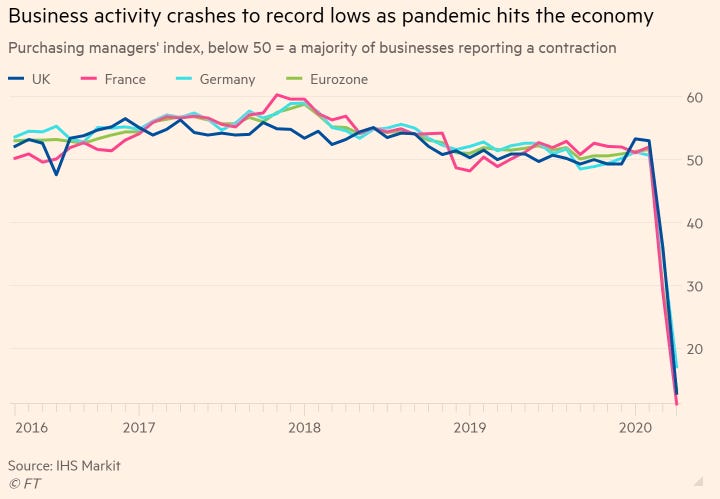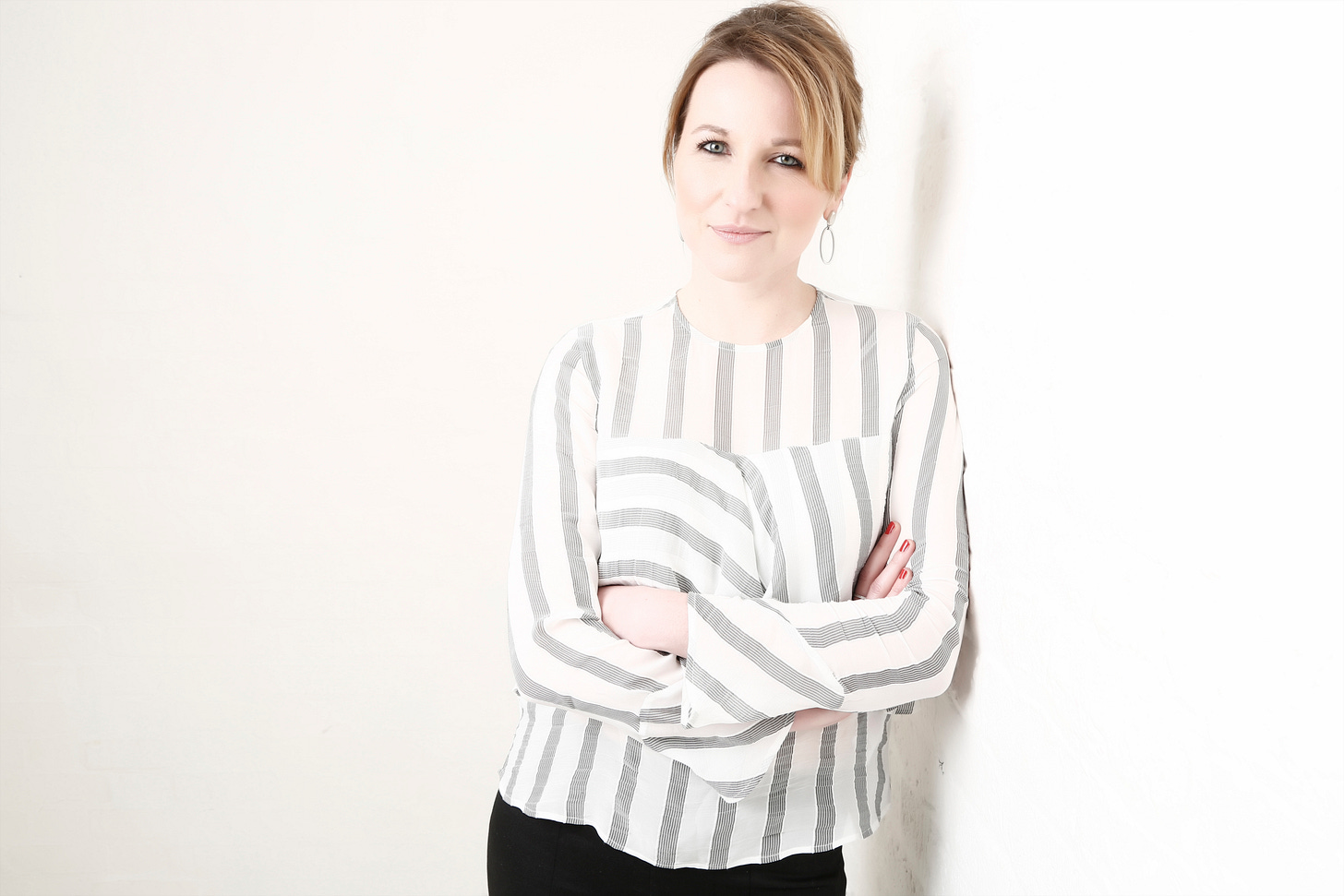Oil prices dipped below zero, UK quadruples its borrowing to £180bn, why should we care about deflation and watch a TED talk about ESG investing and why it matters
Weekly newsletter for women who want to be smart about money: financial news, personal finance and investing
Welcome to our #17 weekly newsletter in 2020.
Every week we curate key articles and content so you can stay informed and inspired about money and investing without the boring bits!
This is your weekly go-to place to read up on all things money-related.
We spend hours sifting through content every week and apply a female-lens to news and content about money and investing so that it is meaningful to you.
Ultimately we want to support you in making well-informed financial decisions, grow your net worth and ensure your financial security.

Photo: fauxels
From The Purse…
Editorial from the Founder
The growing disparity between the global markets and the declining global economy continues.
Although the Bank of England (BoE) has warned that Britain faces the worst contraction in the last several hundred years and we know that the IMF has forecast a global GDP contraction (3.7%) in 2020, the stock market continues to rise.
Analysts and investors claim that global efforts by central banks to stabilise the financial system is what is making them feel positive.
The US has passed another stimulus package valued at $484bn whilst the UK has quadrupled its borrowing to £180bn for the next three months as it grapples with the coronavirus economic impact.
Meanwhile entire industry sectors, such as retail and hospitality, have closed down and prices are beginning to fall. Less demand for goods and services has a deflationary effect on the economy which slows economic growth and unemployment therefore rises.
Last Monday we saw a historic fall in the price of oil due to an excess in the supply as demand has fallen drastically.
However according to Ray Dalio the coronavirus marks a ‘new future’ and potentially a change in the world order.
It goes without saying that it is often those who adapt to change that do better, or certainly survive.
Whilst retailers such as Primark are under full lockdown and losing £650m sales a month, online retailers such as Boohoo and ASOS are growing and looking at acquisitions in the marketplace.
In these uncertain times we must open our eyes to what we might have never considered or even ‘seen’ before. It presents a time of learning and trying new things.
Stay safe.
And I hope you enjoy this week’s newsletter. Until next week!
Jana
The Big Picture
Global markets and economy news, trends and indicators
The Coronavirus Effect:
Oil prices dipped below zero as producers forced to pay to dispose of excess:
US crude fell to negative value for first time in history, on Monday, as stockpiles overwhelmed storage facilities, before rebounding to just over $1 on Tuesday.
The commodity market's volatility skyrocketed to 1,400% this week.
$320bn will be put towards the Paycheck Protection Program, a rescue fund for small businesses.
The legislation will also allocate $75bn for hospitals and $25bn for additional coronavirus testing.
US unemployment continues to rise:
More than 4m Americans filed for unemployment benefit last week.
Total unemployment claims during the pandemic has increased to 26m.
Employment gains of the past decade have been wiped out.
BoE policymaker Jan Vlieghe warned that the coronavirus and the ‘great lockdown’ was having a highly ‘asymmetric impact’.
Manufacturing and services activity in the UK has contracted at its fastest pace on record
Economists at Market said that the reading is consistent with a quarterly fall of GDP by 7%.
UK’s results mirror Europe’s where activity has also dropped the fastest pace on record.

UK government FutureFund pledging £250m match funding for startups affected by the coronavirus:
Startups must have already raised £250K in the last 5 years and secure match funding from private investors to unlock the government funding.
On Thursday, the Treasury said it would raise an additional £180bn over the next three months as tax revenue falls.
The government wants to raise £225bn April-July 2020 by selling bonds. The pre-coronavirus plan was to raise £160bn for the whole year.
The Job Retention Scheme launched in the UK on 20 April has 512,000 claims received, 3.8m employees furloughed, valued at £4.5bn.
Global stock markets continues to diverge from the sharply declining global economy:
Global stocks have jumped 23% even as the IMF forecast a decline in global GDP.
Analysts and investors say that global efforts by central banks to stabilise the financial system is the trigger.
Citigroup estimates that the biggest central banks will buy $5tn of bonds this year, led by the US Federal Reserve.
Looking Ahead in 2020
Billionaire Ray Dalio says that the coronavirus marks the start of a ‘new future’
According to Dalio the economic downturn will be ‘relatively brief’ but would allow for wider global economic restructuring lasting 3-5 years.
“I would say understanding your thinking skills, or using digital support mechanisms for thinking, would be the most valuable (skills),” said Dalio.
Top economist: US coronavirus response is like 'third world' country
Nobel prize-winning economist Josef Stiglitz has criticised Donald Trump saying that the US is on track for a Second Depression.
Wealth tax rise could raise £179bn to tackle Covid-19, experts say
Countries and companies tap fixed-income market with ‘social bonds’ for COVID relief
The $100 trillion global bond market is being tapped by countries and corporations focused on ‘social’ and ‘sustainability’.
These bonds specifically pledge proceeds to Covid-19 related projects including small business support and healthcare.
Coronavirus Impact: Your Money
Insights, trends and what this means for you and your money
Managing personal finances during Covid-19 (George Washington Uni/US)
This will apply to high cost credit, zero interest on pre-arranged overdrafts up to £500 and no adverse change on overdrafts.
How to manage your investment portfolio during the coronavirus (UK)
Avoid the temptation to try and time the market
Make sure your portfolio is well diversified
Swim against the tide of popular opinion
Coronavirus volatility sparks the largest ever outflow from UK funds
The UK lost around £8.7 billion (€9.9 billion) in redemptions, with fixed income taking the hardest hit.
Equity funds saw a relatively small outflow, investors withdrew a net £5.5 billion from fixed income.
Passive vehicles received £3.1 billion of inflows, while their active counterparts saw net redemptions to the tune of just under £4 billion.
Big changes in the economy should not mean big changes in how you invest.
Stay on course to meet your investment goals.
Companies to Watch: winners & losers
Companies to watch and share price movements
68,000 staff are on furlough backed by government schemes around the world.
Primark is losing £650m of sales a month during the international high street lockdown.
It has cancelled all orders with suppliers as it has stocks of £1.5bn in its warehouses and in transit.
ABF has cancelled its half-year dividend and its executive directors have agreed to cut their pay by half while non-executives have taken a 25% cut.
Online retailer, Boohoo reports 54% profit rise and says it is well-placed to assess opportunities.
Annual revenues hit £1.32bn, up by 44% in February.
Pre-tax profit was up 54%, at £92m.
Last year, Boohoo acquired the Coast and Karen Millen brands out of administration.
Its market value of £3.3bn is more than that of Sports Direct and Marks and Spencer combined.
In the Spotlight
Is there a topic you'd like us to Spotlight? Please tweet @jointhepurse
What is deflation and should we be worried about it?
It is already clear that Covid-19 is causing an economic crisis and pushing overall prices to fall.
Entire industries have had to close due to imposed lockdowns including retail, airlines, hospitality and housing. And last Monday we saw a historic dip into negative territory for oil prices.
US inflation is expected to fall below the Federal Reserve’s 2% target and the Eurozone and Japan is expecting negative inflation in a matter of months.
The concern is that in the absence of consumer goods and services overall demand will drop.
Instead of spending the money consumers would normally going to restaurants, travelling they save the money and total economic activity falls.
Although it is not certain what the outcome will be, it is possible that this period of deflation may persist. And the economy may slow down.
Deflation increases the real value of debt therefore reducing the spending power of consumers and companies.
Periods of deflation often lead to economic stagnation and high unemployment.
Have You Seen This?
Female-focused news, reports, research, campaigns
Coronavirus and the gender pay gap: an excuse to avoid uncomfortable truths
UK employers with at least 250 employees were let off the hook for reporting their gender pay gap statistics due to the coronavirus.
With only two weeks to go before the deadline, only 3000 employers or 26% had completed the report.
Research shows that gender diversity drives revenue and performance.
We also know that the coronavirus is having an outsized economic impact on women.
Women dominate in low-paid sectors that are now being disproportionately hit by furloughs and redundancies. More women do unpaid care work around the world’.
Corporations and the government must remain vigilant and play their part.
What We’re Tracking
Female-focused products or services, crowdfunding campaigns, start-ups and businesses led by female entrepreneurs & investment, research
Five sustainable brands led by women (US)
Many female-owned businesses also incorporate a focus on sustainability. Women are aligning their businesses with their personal values
‘Women are stepping into their own power and doing it in a very female way’.
Check out these companies:
Money Habits of the Week
Do you have a money habit you would like to share with us? Tweet @jointhepurse
Make sure you continue to make contributions to your employee pension.
If you are self-employed either open up a SIPP (self-invested personal pension) account and/or continue making a contribution to it.
In the UK, the government provides a tax benefit for every contribution you make.
This means that your money can continue to compound and grow much more quickly.
Caught Our Eye
Digital tools for managing your money and investing
Open Money (UK): is a robo-adviser which combines financial advice with intelligent technology to make the most of your money.

They will provide personalised advice on whether to manage, save or invest your money. The integrated approach allows you to have one view of your finances and decide how to make your money work for you.
The service currently has 45,000 customers in total.
OpenMoney offers three investment portfolios which follow a passive investment strategy using a mix of index funds from Vanguard, iShares and Fidelity. Their annual fees have just been reduced to 0.46%-0.49%.
They are likely to branch out into the mortgage and protection sector.
What We’re Watching
Watch this TED talk (2015) about how individuals have the power to make a difference by investing in companies that champion social values and sustainability.
Audrey Choi (US) is an investment expert and thought leader on how finance can be harnessed to address public policy challenges.
Coffee Break? Read This
8 Self-Employed Women Explain How They're Doing Business In Quarantine
Stop this retro nonsense about lockdown being a return to domestic bliss for women
The first modern pandemic (Bill Gates)
‘We were made for this’: how Slack became the king of the remote work world
We’d love to hear from you. Do you have feedback? Have we missed anything? What would you like to see more of? Get in touch with Jana via the The Purse website or tweet @jointhepurse and @janicka.

The Purse Ltd. Copyright 2020 & All Rights Reserved.






